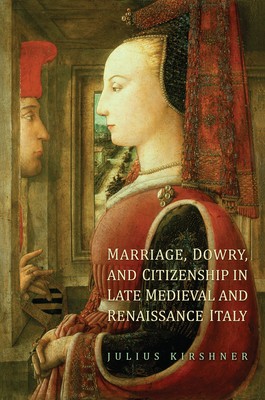
- We will send in 10–14 business days.
- Author: Julius Kirshner
- Publisher: University of Toronto Press
- ISBN-10: 1442614218
- ISBN-13: 9781442614215
- Format: 15.2 x 22.6 x 2.8 cm, minkšti viršeliai
- Language: English
- SAVE -10% with code: EXTRA
Marriage, Dowry, and Citizenship in Late Medieval and Renaissance Italy (e-book) (used book) | bookbook.eu
Reviews
Description
Through his research on the status of women in Florence and other Italian cities, Julius Kirshner helped to establish the socio-legal history of women in late medieval and Renaissance Italy and challenge the idea that Florentine women had an inferior legal position and civic status.
In Marriage, Dowry, and Citizenship in Late Medieval and Renaissance Italy, Kirshner collects nine important essays which address these issues in Florence and the cities of northern and central Italy. Using a cross-disciplinary approach that draws on the methodologies of both social and legal history, the essays in this collection present a wealth of examples of daughters, wives, and widows acting as full-fledged social and legal actors.
Revised and updated to reflect current scholarship, the essays in Marriage, Dowry, and Citizenship in Late Medieval and Renaissance Italy appear alongside an extended introduction which situates them within the broader field of Renaissance legal history.
EXTRA 10 % discount with code: EXTRA
The promotion ends in 22d.12:42:48
The discount code is valid when purchasing from 10 €. Discounts do not stack.
- Author: Julius Kirshner
- Publisher: University of Toronto Press
- ISBN-10: 1442614218
- ISBN-13: 9781442614215
- Format: 15.2 x 22.6 x 2.8 cm, minkšti viršeliai
- Language: English English
Through his research on the status of women in Florence and other Italian cities, Julius Kirshner helped to establish the socio-legal history of women in late medieval and Renaissance Italy and challenge the idea that Florentine women had an inferior legal position and civic status.
In Marriage, Dowry, and Citizenship in Late Medieval and Renaissance Italy, Kirshner collects nine important essays which address these issues in Florence and the cities of northern and central Italy. Using a cross-disciplinary approach that draws on the methodologies of both social and legal history, the essays in this collection present a wealth of examples of daughters, wives, and widows acting as full-fledged social and legal actors.
Revised and updated to reflect current scholarship, the essays in Marriage, Dowry, and Citizenship in Late Medieval and Renaissance Italy appear alongside an extended introduction which situates them within the broader field of Renaissance legal history.


Reviews